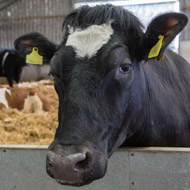
Study highlights potential of analysing milk from storage tanks
A novel, less-invasive method of carrying out testing for foot-and-mouth-disease virus (FMDV) has been developed by researchers at The Pirbright Institute.
Writing in the journal Veterinary Methodology, researchers describe the technique, which involves using milk from bulk tanks or milk tanks. Their results suggest that testing milk samples could aid disease surveillance before and after disease outbreaks.
Foot-and-mouth disease costs an estimated US $11 billion per year in direct losses and vaccinations. When outbreaks occur in countries that are usually FMDV-free, the impact is particularly devastating.
Control of FDMV is reliant on the rapid and accurate detection of the virus. Current tests often use blood or tissue samples, which can be invasive and require the expertise of an animal health professional.
Researchers say the new method could be applied to disease surveillance in dairy herds, as testing of milk tanker samples could be sensitive enough to identify an infected cow in herds of up to 1000 individuals.
The test produces a result in as little as four hours and can identify the virus up to 28 days after the animal becomes infected - far longer than what is afforded by traditional methods. Researchers say this makes it a promising surveillance tool for use during potential outbreaks in FMDV-free countries.
Sampling from milk storage tanks also eliminates the need to test animals individually and does not require a veterinary surgeon to be called out for sampling. As such, this reduces the cost of testing and prevents animals from getting stressed.
“Milk is already used as a surveillance tool for a number of diseases, such as bovine viral diarrhoea and brucellosis, so it makes sense to investigate this approach for the detection of FMDV,” said Bryony Armson, first author of the research. “We were able to detect virus in milk from FMD infected cows during a real outbreak, and virus could be detected for a longer period in milk than in serum.
“We have also shown this FMD detection method can detect the virus in dilutions equivalent to those that would be present in bulk milk storage, highlighting the potential for milk to be used as a surveillance sample.”
The study was conducted with partners at the USDA Animal Plant Health Inspection Service Foreign Animal Disease Diagnostic Laboratory, USA.
Image (C) The Pirbright Institute



 The latest
The latest